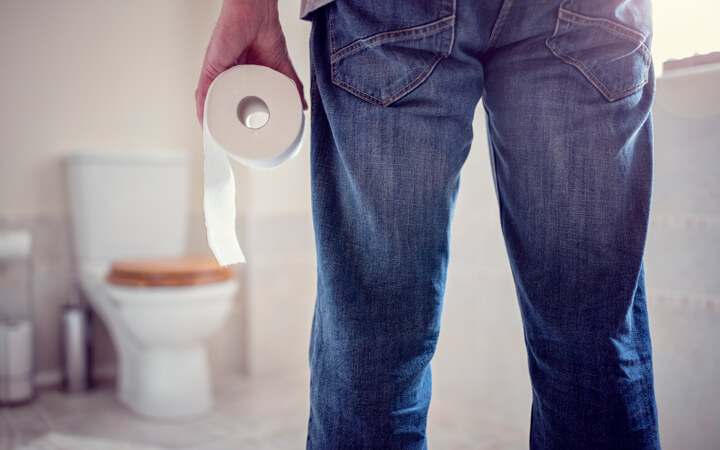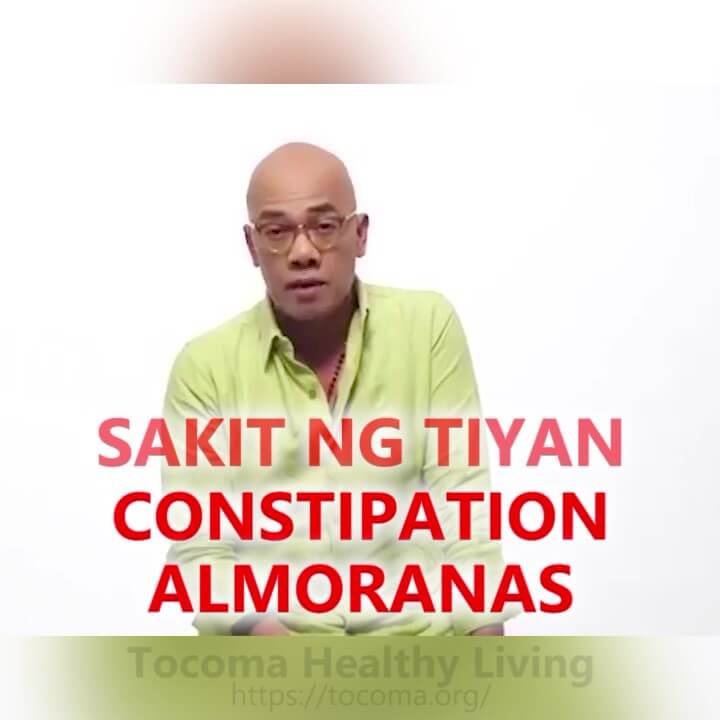Here’s another question that was asked in our website comment that we will also answer thru this article:
“My boyfriend has been experiencing difficulty in pooping since March. And sometimes there’s blood in his stool. His “tumbong” also aches after pooping. I’m afraid he has colon cancer. He’s afraid to go see a doctor.”
Difficulty popping? Blood in the stool? Rectal pain? There are many causes behind these conditions, and it does not automatically mean that one has colon cancer.
There are several common problems affecting the colon and rectum. These conditions include constipating, irritable bowel syndrome, anal fissures, hemorrhoids, colitis, abscess, polyps, and colon cancer.
Many people have difficulty moving their bowels. Many factors contribute to this problem, including activity level and diet. Other causes are unknown.
This article will describe some of the more common bowel problems. We also provide tips to encourage your reluctant loved one to see a doctor.
Difficulty Popping, Blood in Stool, and Rectal Pain: Common Causes
Functional Disorders
Functional disorders are conditions in which the bowel looks normal, but doesn’t work properly. These disorders are the most common problems that affect the colon and rectum. Some common functional disorders include:
- Constipation. By definition, constipation is small, hard, or infrequent stools. Constipation may be caused by inadequate fiber intake, not drinking enough fluids, movement problems in the large bowel, and poor habits (delaying using the toilet).
A person who is constipated may experience difficulty in pooping, strain during a bowel movement, or pass a very hard stool. Passage of hard stool may further lead to anal problems, such as fissures or hemorrhoids. - Irritable Bowel Syndrome. Irritable bowel syndrome (IBS) is a condition in which the colon muscle contracts in an abnormal way, which may result in several problems. Some people have diarrhea, others have constipation, while others alternate between diarrhea and constipation. The abnormal contraction can result in high pressure that builds up in the colon, causing bloating, abdominal cramps, gas, and an urgent need to poop.
Structural Disorders
Structural disorders are conditions in which there is something abnormal that may need to be altered, repaired, or removed through an operation. These may include removing a portion of the colon or diverticulitis or cancer.
Anal Disorders
- Internal Hemorrhoids. Internal hemorrhoids are normal blood vessels that line the inside of the anal opening – everyone has them. However, when internal hemorrhoids become enlarged as a result of pregnancy or straining, they may become irritated and start to bleed. Sometimes, internal hemorrhoids can become large enough to bulge outside the anal opening.
- External Hemorrhoids. External hemorrhoids are veins found just under the skin on the outside of the anus. Typically, they don’t cause any symptoms. However, a blood clot can sometimes form and can be very painful. These are not dangerous blood clots that can travel to other organs – the biggest concern that they raise is pain.
Many times, it gets better on its own. However, there may be times when the clot has to be removed under local anesthesia in the doctor’s office. - Anal Fissure. An anal fissure is a tear or split in the lining of the anus that happens after trauma. This can happen as a result of a hard stool or diarrhea. An anal fissure causes bleeding and intense burning pain after bowel movements.
Often, anal fissures heal on their own. However, if they don’t improve, your doctor can recommend a medication or ointment that will relieve the pain. In some cases, surgery may become necessary if the tear does not heal. - Perianal Abscess. The anal region has tiny glands on the inside of the anus that open and help with the passage of stool. However, when one of these glands becomes blocked, an infection may develop and an abscess may form (a pocket of pus). Treatment includes draining the abscess, typically under local anesthesia in the doctor’s office.
Colon and Rectal Disorders
- Colitis. Colitis is a group of conditions that result in the inflammation of the large bowel. Essentially, colitis is an inflammation of the inner lining of the colon.
There are different types of colitis, including infectious colitis, ulcerative colitis, ischemic colitis, radiation colitis, and Chron’s disease. Colitis causes diarrhea, abdominal cramps, the urgency to poop, and rectal bleeding. - Diverticular Disease. Colonic diverticula are little sacs in the bowel lining that form when the lining gets pushed through weak spots in the bowel wall muscles. They typically appear in the sigmoid colon, where the large bowel exerts the highest pressure.
Diverticular disease is very common in Western societies, probably because of low-fiber Western diets. The diverticular disease rarely causes symptoms, unless one of the sacs gets blocked and infected. This is known as diverticulitis and occurs in roughly 10% of people with diverticula. Sometimes, there is bleeding in this area. - Polyps and Cancer. Cancer of the colon and rectum occurs when the cells in the lining of the large bowel grow and divide in an uninhibited manner. Many factors contribute to this loss of control, including genetics, diet, and the environment.
The first abnormality you’ll notice in the bowel in colon cancer is a polyp. A polyp is a small growth that may look like a mushroom protruding from the lining tissue of the large bowel. There are several types of polyps, and not all types turn into cancer. However, removing these polyps before they cause severe changes and grow can prevent the progression of cancer.
When cancer develops, it has to be removed through surgery. Chemotherapy may be suggested for cancer of the colon or rectum. Further, certain cancers of the rectum may require radiation treatment.
Because colorectal cancer comes from polyps, a colonoscopy procedure may prevent colorectal cancer by finding and removing polyps. People who are at higher risk for colorectal cancer include those with a family history of colorectal cancer or those who have had polyps or cancers in the past.
By seeking timely medical care, many diseases of the colon and rectum can be prevented or treated. People who have symptoms of any of these conditions should consult their doctor right away.
Most importantly, colon cancer is a preventable disease. The most important risk factor for colon cancer is having a direct family member who had the disease. Talk to your doctor when you need an evaluation to look for polyps. For people with no family history and no symptoms, the current suggestion is that everyone should have their first colonoscopy at age 50.
5 Tips to Convince a Reluctant Loved One to Visit a Doctor
Is your loved one reluctant to see a doctor? Whether it’s out of fear or something else, there are ways that you can convince them to seek the medical care that they need.
Below, we list down some common reasons why people refuse to see a doctor, as well as some tips to help convince them to go.
Common Reasons Why People Refuse to Seek Medical Care
- Fear of what the doctor will say
- Medical care is too expensive
- Too busy
- Embarrassment about the medical condition
- Denial of current health status
- Fear of painful medical procedures
- Bad past experience with a doctor, medical procedure, or healthcare facility
Tips to Convince Your Loved One to Visit a Doctor
- Approach the subject carefully. Don’t back your loved one into a corner – corning them might make them even more resistant. Have a conversation with no pressure. Choose a time when you’re both relaxed and able to talk without distractions and bring up the subject casually.
- State your concerns clearly. If your loved one isn’t open to a casual suggestion, you may have to approach the discussion head-on. Be clear and direct about your concerns, especially if you are seriously worried about their health.
Let them know about your concerns with love. You might say, “Hey, I can tell that you have been experiencing difficult pooping for several weeks and that there is blood in your stool. I love you and I am worried. I would feel so much better if you see a doctor.” - Ask questions. If your loved one continues to resist, you may want to ask them questions. Finding out why they are reluctant to see a doctor may help you come up with a solution. You might ask, “What don’t you like about going to the doctor?” or “
Is there something, in particular, you’re worried about?” You might also want to take a more straightforward approach by asking, “Why don’t you want to go to the doctor?” - Offer to get a checkup too. Your loved one may feel less anxious if you join them at the doctor’s office as a patient, too. This may release them from the pressure of thinking that they are the only ones with a problem. Make it casual, like you both simply have to get a yearly examination. Your loved one may be more inclined to see a doctor with this approach.
- Know your limits. Despite your best effort, your loved one is ultimately the one who has to make this decision. Unless they are at risk of hurting themselves or others, you can’t force the issue. Be honest with yourself and recognize that there is only so much that you can do.
The Bottom Line
Difficulty popping? Blood in the stool? Rectal pain? There are many causes behind these conditions, and it does not automatically mean that one has colon cancer.
For an accurate diagnosis of your condition, make sure to see your doctor.





